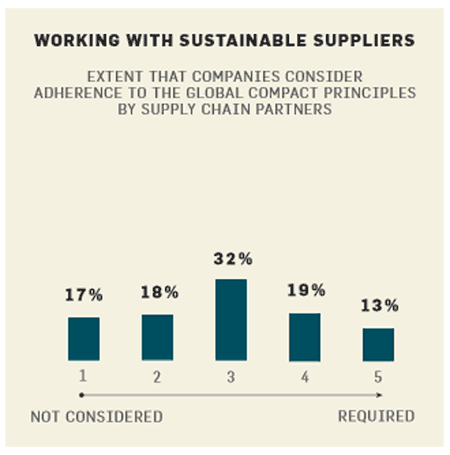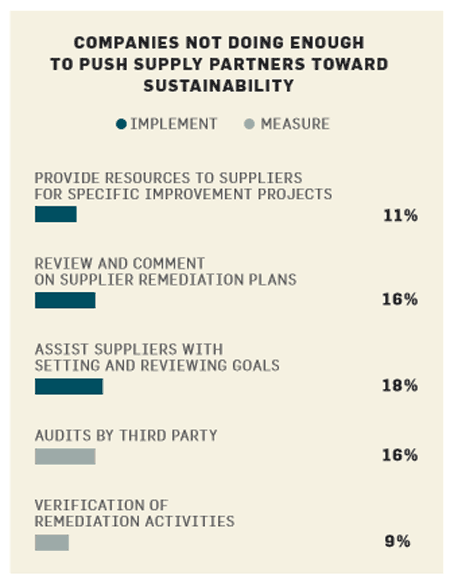The UN Global Compact is a sustainability-focused organization launched in 2000 that now has some 8,000 corporate members worldwide.
In its 2013 report, the organization says overall sustainability progress is being made, but that there is still often more talk than action in improving corporate sustainability performance. Of the 8000 corporate members, a little more than 1700 completed the survey in late 2012 that formed the basis of this year's report.
However, there is also an interesting geographic slant to this: companies in Europe represented 55% of total respondents. Just 4% came from North America, less than the 16% that came from Asia and the 17% from Latin America. We're not quite sure what to make of that.
We would also think the data would be biased strongly upward, meaning companies taking strong sustainability actions would seem much more likely to participate in the survey than those that are less committed and active.
All that said, the data is worth looking at, but should be taken in the context that the numbers probably largely represent that upper quarter of companies in terms of sustainability, rather than the average company.
The full UN Compact sustainability model includes areas including labor, the environment, overall management practices and more, including sustainable supply chain stewardship.
Overall, the report says, "CEOs and board members are making meaningful commitments to sustainability progress at high percentages. From there, there's a drop-off, sometimes fairly steep, in the number of companies that are following through with actions to implement, measure and communicate sustainability."
Interestingly, the report says that "supply chain is where companies are doing less overall than in any other area." We suspect that if true that is because the supply chain is where the rubber really hits the road, and firms run into real tradeoffs especially around cost that can be very hard to manage.
Supplier Enforcement is Lacking
Within the supply chain domain, "While a majority of companies have established sustainability expectations for their suppliers, they are not tracking compliance or helping suppliers reach the desired goals," according to the report.
The report includes a chart, reprinted below, that shows a sort of classic bell curve in terms of how aggressively companies are pushing the UN Compact's principles down to their suppliers. It shows that just 13% make a the UN principles a supplier requirement, versus 17% that say they are not even considered.

Source: UN Sustainability Report 2013
However, the percentage saying that adherence to the principles is required has about doubled since 2008, while the percentage saying they are not considered has likewise fallen by almost half.
TheGreenSupplyChain.com will also note that there are many organizations that have principles or practices, such that specifically focusing on the Compact's list may not make sense for any one individual company.
When companies were asked to rank the factors slowing or blocking advancement to the next level of sustainability performance, large companies cited "extending corporate sustainability strategies through the supply chain" as the top barrier they faced (54%).
59% of companies are setting measurable sustainability goals internally, while 57% are doing for external suppliers. We'll note that smaller and even many mid-size companies may simply not be in a position to set such supplier targets.
However, here again, the report finds more talk than action. As shown in the chart below, many actions that are related to implementing and measuring sustainability goals have a much lower achievement rate.

Source: UN Sustainability Report 2013
It adds that "Even those actions that scored relatively higher (in the 30% range), such as training procurement staff on corporate responsibility and self-assessments for suppliers, have remained in neutral for years."
Along the same vein, the report says that "while companies are making progress in terms of thinking about supplier sustainability and setting expectations, the supporting actions that will drive adherence have shown little or no increase over the past few years."
And again, this data is likely primarily from sustainability leaders.
The UN is optimistic this will start to change, as companies that push overall sustainability and supplier conformance to standards will reap demonstrable business benefits that will drive a greater sustainability focus by others.
Is that really true? That of course is the multi-billion dollar question.
The full report is available here: UN Global Corporate Sustainability Report 2013
Any reaction to the 2013 UN report? Will clear business benefits from sustainability really compel others anytime soon? Let us know your thoughts at the Feedback button below.

|
|